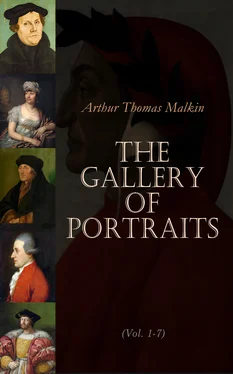After Buchanan had finished his studies at St. Andrew’s, and taken the degree of Bachelor of Arts, he accompanied Major to Paris, where his attention was more seriously turned towards the doctrines of the reformation, which at that time were eagerly and warmly discussed; but whether from fear of the consequences, or from other motives, he did not then declare himself to be a Lutheran. For five years he remained abroad, sometimes employed, sometimes in considerable want; at the end of which time he returned to Scotland with the Earl of Cassilis, by whom he had been engaged as a travelling companion. His noble patron introduced him at the court of James V. the father of Mary Stuart. James retained him as tutor to his natural son, James Stuart, afterwards Abbot of Kelso. It has been proved that he was not tutor to the King’s other natural son, James Stuart, afterwards Earl of Murray and Regent of Scotland, whose first title was Prior of St. Andrews.
While he was at court, having a good deal of leisure, he amused himself with writing a pretty severe satire on the monks, to which he gives the name of “Somnium.” He feigns in this piece that Saint Francis d’Assize had appeared to him in a dream, and besought him to become a monk of his order. The poet answers, “that he is nowise fit for the purpose; because he could not find in his heart to become slavish, impudent, deceitful, or beggarly, and that moreover very few monks had the good fortune, as he understood, to reach even the gates of paradise.” This short satire was too well written, and too bitter, to pass unnoticed, and the sufferers laid their complaint before the king: but as Buchanan’s name had not been put to it, they had no proof against him, and the matter dropped. Soon after the Franciscans fell into disgrace at Court; and James himself instigated the poet to renew the attack. He obeyed, but did not half satisfy the King’s anger in the light and playful piece which he produced. On a second command to be still more severe, he produced his famous satire ‘Franciscanus,’ in which he brings all his powers of wit and poetry to bear upon the unfortunate brotherhood. The argument of the poem is as follows:—he supposes that a friend of his is earnestly desirous to become a Cordelier, upon which he tells him that he also had had a similar intention, but had been dissuaded from it by a third person, whose reasons he proceeds to relate. They turn upon the wretched morals and conduct of those who belonged to the order, as exhibited in the abominable lessons which he puts in the mouth of an ancient monk, the instructor of the novices. He does not give this man the character of a rough and ignorant priest, but makes him tell his tale cleverly, giving free vent to every refinement in evil which the age was acquainted with, and speaking the most home truths of his brethren without fear or scruple. The Latin is pure, and free from the barbarisms of the time.
After such a caustic production, it is no wonder that the party assailed made use of every means to destroy its author. The King, who was a weak and variable man, after much importunity on their part, allowed them to have Buchanan arrested in the year 1539, on the plea of heresy, along with many others who held his opinions about the state of the Scottish church. Cardinal Beatoun, above all others, used his best endeavours to procure sentence against him; he even bribed the King to effect his purpose. But Buchanan’s friends gave him timely warning of the prelate’s exertions, and, as he was not very carefully guarded, he made his escape out of the window of his prison, and fled to England. He found, however, that England was no safe place for him, for at that time Henry VIII. was burning, on the same day and at the same stake, both protestant and papist, with the most unflinching impartiality. He went over, therefore, for the third time into France; but on his arrival at Paris, finding his old enemy the Cardinal Beatoun ambassador at the French court, and being fearful that means might be taken to have him arrested, he closed with the offer of a learned Portuguese, Andrea di Govea, to become a tutor at the new college at Bourdeaux. During his residence there he composed his famous Latin Tragedies, ‘Jephthes’ and ‘Joannes Baptistes,’ and translated the Medea and Alcestis of Euripides into Latin metre, for the youth of his college. The two latter show that his acquaintance with the Greek language was by no means superficial.
After holding this situation for about three years, Buchanan went with Govea, at the instance of the King of Portugal, to a lately established school at Coimbra. Before he ventured into Portugal, however, he took care to let the King know that his Franciscanus was undertaken at the command of his sovereign, and therefore ought nowise to endanger his safety in Portugal. The King promised him his protection. But he had not been at Coimbra long, before he was accused by the monks of heresy, and the King, forgetting his promise, allowed them to keep Buchanan prisoner in a convent, as they declared, for the purpose of reclaiming him. They gave him as a penance the task of translating the Psalms of David from the Vulgate into Latin verse. This he accomplished to admiration; and his production is acknowledged to surpass all works of the like sort. The metres are chiefly lyrical. He was soon after dismissed from prison, and took ship for England, and staying there but a short time, he returned again to France. Here the Marechal de Brissac intrusted him with the education of his son Timoleon de Cossé. While thus employed he studied, more particularly than he had hitherto done, the controversies of the day with regard to religion, and became most probably a confirmed protestant, though he did not openly renounce catholicism till some time afterwards. He wrote, and dedicated to his pupil, a much admired piece, entitled ‘Sphœra,’ during his tutorship. In the year 1560 he returned again to Scotland, the reformed religion being then prevalent there, and became publicly a member of the Protestant Kirk.
The most important, because the most public part of Buchanan’s life now begins. Such a man could not long remain unnoticed by the great in Scotland, and Mary Stuart herself became one of his best friends. He had written for her two epithalamia, one on her marriage with the Dauphin, and one on her marriage with Lord Darnley. Her respect for his abilities was very great, and she had him appointed tutor to her son a month after he was born, in the year 1566.
It is a matter of no small wonder, that Buchanan, who was James’s most influential tutor, for the three others, who were joined in the commission with him, were under his superintendence, should have educated him as he did, or made him what he was. A book which Buchanan published, and which is among the most famous of his works, ‘De jure Regni apud Scotos,’ being a conversation between himself and Maitland the Queen’s secretary, contains (though dedicated to his royal pupil) sentiments totally at variance with all the notions of James. In it Buchanan follows the ancient models of what was thought a perfect state of policy. He proves that men were born to live socially—that they elected kings to protect the laws which bind them together—that if new laws are made by kings, they must be also subjected to the opinion of the states of the nation—that a king is the father of his people for good, not for evil—that this was the original intention in the choice of Scottish kings—that the crown is not necessarily hereditary, and that its transmission by natural descent but for its certainty is not defensible—that a violation of the laws by the monarch may be punished even to the death, according to the enormity of it—that when St. Paul talks of obedience to authorities he spoke to a low condition of persons, and to a minority in the various countries in which they were—that it is not necessary that a king should be tried by his peers. He concludes by saying, “that if in other countries the people chose to exalt their kings above the laws, it seems to have been the evident intention of Scotland to make her kings inferior to them.” In matters of religion he rails against episcopal authority of all kinds. Now nothing can be more opposed than all this to the opinions of James, who most strongly upheld the divine right of kings, and episcopal authority. Buchanan, when he was accused of making James a pedant, declared it to be “because he was fit for nothing else.” He was a stern and unyielding master, and no sparer of the rod, even though applied to the back of royalty; and this may in some measure account for the want of influence which he had over the King’s mind. James advises his son, in his βασίλικον δῷρον not to attend to the abominable scandals of such men as Buchanan and Knox, “who are persons of seditious spirit, and all who hold their opinions.”
Читать дальше












